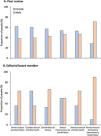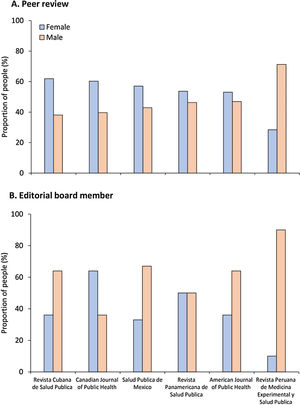Despite an increase in the participation of women in scientific publications, a gender gap persists with a predominantly male authorship, especially in high-impact factor journals.1 Similarly, there is a lower proportion of women participating as peer reviewers or editors for journal publications.2
We determined the extent of women's participation in peer review and as editorial board members for public health journals from the American continent indexed in the peer-reviewed literature database Scopus. By using the journal websites, we searched for each journal's list of peer reviewers and editorial board members for the year 2018. If reviewers’ names were not available on a journal website, an email was sent to the journal requesting the list of their peer reviewers. A simple random sample of the list of reviewers for several journals was selected.
A total of nine public health journal websites were reviewed, from which six journals were selected for data extraction and analysis, whereas the remaining three journals did not respond to our request for a list of their reviewers which was not available on their website. Our results showed that, compared to men, women's participation in peer review was higher (>50%) for five of the six selected journals (Revista Cubana de Salud Pública, Canadian Journal of Public Health, Salud Pública de México, Revista Panamericana de Salud Pública, and American Journal of Public Health). By contrast, there were lower percentages of women as editorial board members, compared to men, for four of the six selected journals (Revista Cubana de Salud Pública, Salud Pública de México, American Journal of Public Health, and Revista Peruana de Medicina Experimental y Salud Pública) (Fig. 1).
Few studies have reported on women's participation as peer reviewers and editorial board members for public health journals.3 Despite the higher proportion of women participating in peer review for the six public health journals analysed, it is unclear if there is an established policy of gender equality for these journals. For instance, a recent study reported that women constituted 52.8% of the reviewers for a Spanish public health journal.4 One possible explanation for our finding is that a greater representation of women on the editorial board could influence the selection of reviewers to be more female-orientated.2,3 Therefore, these findings, as well as the experiences of other scientific journals, can prove useful to promote gender equality in the editorial process.5
Authorship contributionsH. Arroyo-Hernández designed the study. H. Arroyo-Hernández and M.C. Ramírez-Soto collected data, performed the statistical analysis, drafted the manuscript, and approved the final manuscript.
FundingNone.
Conflicts of interestH. Arroyo-Hernández and M.C. Ramírez-Soto are members of the editorial board of the Revista Peruana de Medicina Experimental y Salud Publica.

















